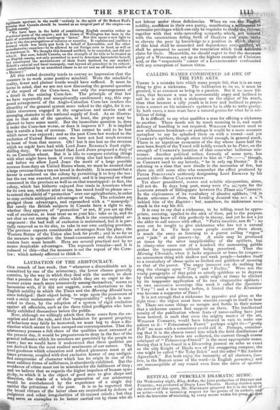CALLING NAMES CONSIDERED AS ONE OF THE FINE ARTS.
THERE is a mistake into which many people fall, that it is an easy thing to give a nickname. The inclination to do so, it must be granted, is as common as being in a passion. But it no more fol- lows, that because a man is unreasonably angry and inclined to rail he is able to stick a nickname on the object of his wrath, than that because a silly youth is in love and inclined to perpe- trate a sonnet on his mistress's eyebrow he is able to write poetry. In both cases, a man must have a natural genius for what he is am- bitious of doing.
It is difficult to say what qualifies a man for affixing a nickname to another. There needs not be much meaning in it, and much delicacy of handling is not required. WILLIAM Connarr used to sow nicknames broadcast—or perhaps it would be a more accurate metaphor to say he splashed them on with a trowel—and yet COBBETT'S epithets, though often trivial enough, in general stuck. There is an ingenious economist of the day whose name half the men born South of the Tweed will boldly avouch to be Peter, on the strength of ConnErr's iteration of that somewhat ludicrous mis- nomer. Another political writer, formerly of some note, has received many an epistle addressed to him as "Dr. —," though, as ComiErr used to say latterly, "be is only my Doctor." It is referring to a time that now dwells in the memories of few, but there are still some alive who remember the effect produced by PETER PoncuriNE's uniformly designating Lord ERSKINE by his second title—Baron CLACKMA SEAN.
Yet sheer grossierete, coarse and voluble vitimeration, alone, will not do. In days long past, many were tke c.e,sts for the Laureateivreath of Billingsgate between th Times anu r:OBBETT. In the copiousness of its vocabulary of abusive epithets, d in fluent utterance of them, the Leading Journal 'Nab net a ;t behind him of the Register ; but;, eomehew, its nicknamea never stuck in the way his did.
It is easy to say that a nickname, to be telling, must be appro- priate, amusing, applied in the nick of time, pat to the purpose. A man may know all this perfectly in theory, and yet be not a jot the abler to call names with effect. "Pate nascitur, non fit ": no man can be taught to give nicknames who has not a natural genius for it. To hear some people scatter them about, is much the same as listening to a parrot calling "rogue" and " jade " at all passers - by. A smile may be produced at times by the utter inapplicability of the epithets, but in ninety-nine cases out of a hundred the unmeaning gabble strikes the tympanum without being perceived. Thus the Morning Chronicle, when it lacks argument or loses its temper— no uncommon thing with shallow and weak people—betakes itself to a vocabulary of abuse quite as limited and guiltless of meaning
as that of the parrot. The angry innocent can do nothing but ring the changes upon " Tory" and " Peelite." Were not the washy paragraphs of that print so utterly spiritless as to depress by their contagious dullness, a smile might at times be elicited by its inapposite application of its two vituperative epithets : on two successive mornings this week it called the Spectator " Tory " ! and a few weeks before, it hinted that the Examiner was become a supporter of PEEL!
It is not enough that a nickname be apposite and given at the
right time : the object must have stamina enough in itself to bear it. There are some things so meagre and feeble in their nature that a nickname cannot find support on them. The intellectual tenuity of the publication whose feats of name-calling have just been noticed, is such that even the mighty master of the art, WiLi.147a CORBETT, would have laboured in vain to make one adhere to it : " Palmerston's Parrot" perhaps might do—"pretty Poll" no man with a conscience could call it. Perhaps, consider- ing that it is the chosen vessel into which the fetid distillations of the Ex-Secretary's brain are collected, the current though coarse sobriquet of "Palmerston-Utensil" is the moat appropriate name. Seeing that it has found in a Dissenting journal an echo as exact as the silly Knight of Illyria was of his swaggering compeer, the one might be called "Sir Toby Belch" and the other "Sir Andrew Aguecheek." But both enjoy the immunity of all shadows (tan- brce, in the Roman sense of the word—in English parasites) and are unsusceptible of any wound even from the darts of sportive malice.


























 Previous page
Previous page